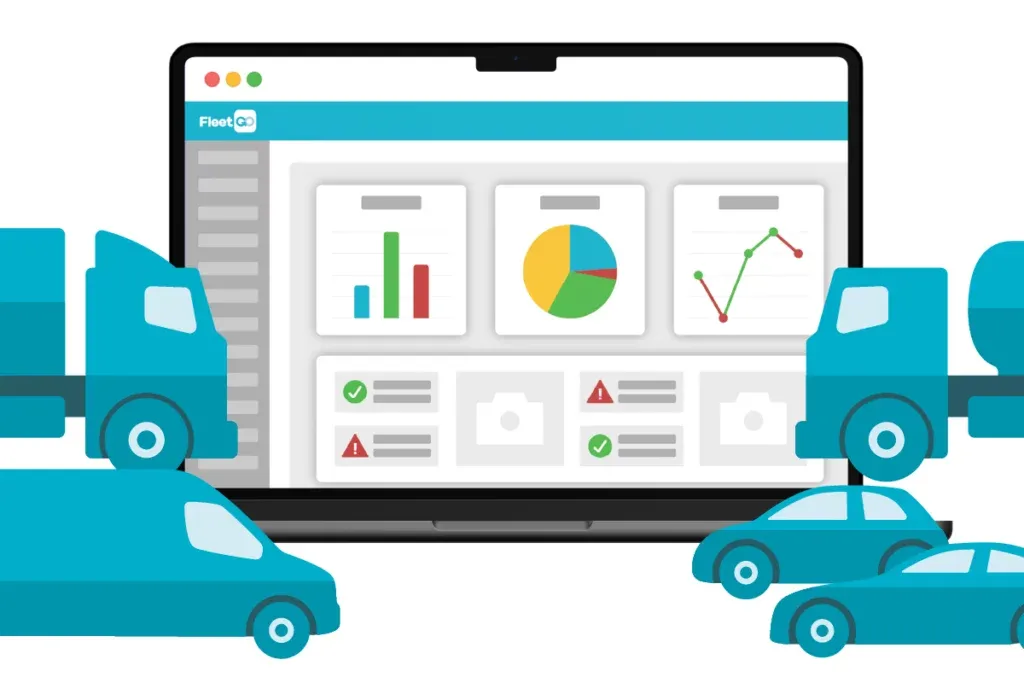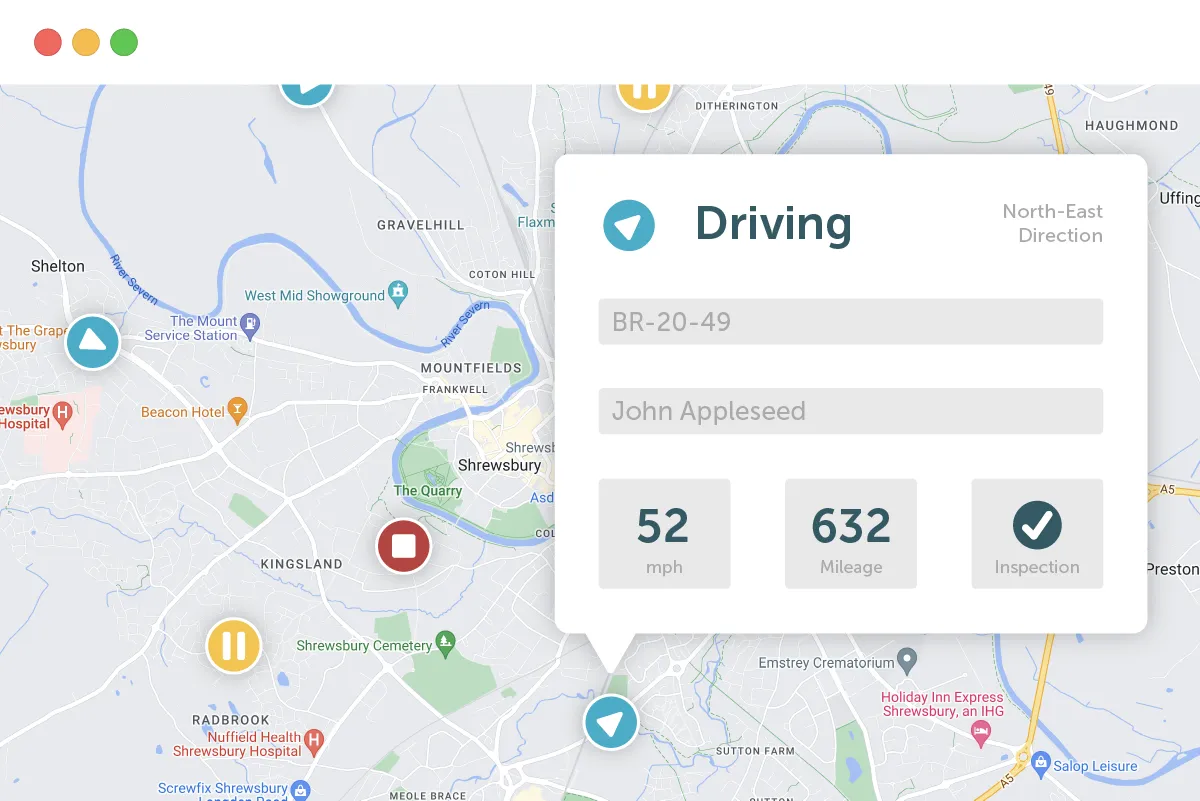Managing a fleet of commercial vehicles is challenging without a vehicle management system (VMS). Managers need to remain agile to improve efficiency. In the digital era, fleet companies require access to fleet-related metrics on their daily operations to deal with arising problems. The primary source of these metrics is the vehicle fleet management system. Vehicle management software and telematics provide historical and real-time data on fleet operations. The system can collect data on vehicle status and location, fuel consumption and costs, mileage and driver behaviour. Read on for details on how the vehicle management system works and its benefits.

- What Is Vehicle Management System Software?
- What Are the Must-have Features of a Vehicle Fleet Management System?
- Fleet vehicle tracking
- Alerts and notifications
- Driver behaviour metrics
- Fuel management
- Mileage
- Vehicle maintenance
- What Are the Advantages of a Fleet Management Vehicle Tracking System?
- How To Select a Vehicle Tracking Fleet Management System
- Conclusion
What Is Vehicle Management System Software?
Achieving efficiency in fleet operations requires reliable data and control. Logistics companies that treat vehicle usage as a simple and untracked resource are missing out on crucial data that could improve efficiency. A vehicle management system allows tracking the use of all fleet movements.
Logistics companies can use the fleet management system to collect, monitor and record vehicle information. The information used in vehicle management software can be imported from external sources. The software collects data from digital tachographs to get information on the speed, location, distance and drivers’ behaviours.
A VMS can use GPS technology to track the location of fleet vehicles and drivers. Data from digital tachographs is also remotely downloaded to the fleet management system for analysis. A fleet manager can access the information from any device. It is an elaborate system that oversees various aspects of fleet operation and tracks relevant data.
What Are the Must-have Features of a Vehicle Fleet Management System?
Fleet managers require various metrics and data to manage daily operations. The must-have features of vehicle management system software include:
Fleet vehicle tracking
It’s crucial to know the real-time location of all the fleets on the map. That’s why GPS vehicle tracking is essential to the vehicle management system. With fleet vehicle tracking capabilities, managers know exactly where every truck is, the route they are following, and the stops.
Start Tracking Your Fleet
Get started with Fleet Tracking from FleetGO. You will have a complete overview of your fleet. See the GPS location of your drivers in real-time and optimes your operations.
Manage your Fleet on the GO

Alerts and notifications
A fleet management vehicle tracking system should have alerts and notifications for emergencies. The alerts notify the manager when something is wrong with a truck. Status alerts inform the driver and the fleet manager about the vehicle’s status, like overheating or battery problems. It allows prompt response to minor problems to avoid breakdowns. Since the vehicle management system is connected to the onboard diagnostic device (OBD), it monitors the health of the vehicles in the fleet. The system sends an alert with the malfunction whenever there is a problem.
Driver behaviour metrics
Fleet management software should collect relevant driver behaviour data. The system monitors and generates data that outlines driver activity and behaviour. Driver scorecards help in identifying alarming driving behaviour. For instance, the VMS system records fast acceleration, hard braking and sharp turns. The metrics can help implement safety policies and address the driver’s behaviours.
Fuel management
Fuel consumption monitoring is a must-have component in a VMS to control and optimise fuel costs. Fleet managers can optimise fuel costs by monitoring and reporting fuel usage. For instance, they can prevent excessive engine idling, fuel theft and dangerous driving behaviour.
Mileage
The trip log feature allows storage of historical data of a trip, including tracking the routes on the map and collecting behavioural data and malfunction alerts. Monitoring the fleet’s mileage for tax deductions and better fuel economy is also possible.
Vehicle maintenance
Fleet management software should provide vehicle maintenance features. Proactive vehicle maintenance ensures repairs are done on time to minimise downtimes. A VMS achieves vehicle maintenance by recording vehicle status reports and collecting diagnostic data required to keep everything under control.
What Are the Advantages of a Fleet Management Vehicle Tracking System?
An efficient fleet tracking system provides multiple benefits to fleet managers, including:
Streamlining operations:
A modern vehicle management system has everything that a fleet company or transportation firm requires to streamline fleet operations. Fleet managers can easily optimise routes and improve driver productivity. Since maintenance is done on time, fewer downtimes improve a company’s overall efficiency. A fleet manager also monitors drivers’ hours and maps the routes to minimise stops and increase productivity.
Informed decisions:
A fleet manager tracks key metrics using the fleet management system, including vehicle status, fuel consumption, driver performance and maintenance. By carefully monitoring the metrics of a vehicle, the company can make data-driven decisions. For instance, tracking areas that require cost reduction and performance optimisation is easier. Informed decisions help decrease costs, ensure drivers’ safety and optimise fleet operations.
Time effectiveness:
Manual fleet management is hectic for managers. Aside from collecting data and monitoring information, a fleet manager has to analyse the information collected. The daily routine can be hectic if the company operate a large fleet of cars. Fleet vehicle management software allows managers to manage their routines effectively since most tasks are automated. A good VMS provides a tachograph analysis of the metrics collected and minimises the time required to analyse complex data.
Cost efficiency:
Monitoring a vehicle’s health at regular intervals minimises breakdowns and the need for costly repairs. A fleet tracking system keeps vehicles in good condition, and work hours are preserved. Routine maintenance also extends the lifespan to maximise output. The vehicle management system can improve cost efficiency by minimising poor driver behaviour. Monitoring driver performance makes it easy to find corrective measures and offer training to correct careless and aggressive driving patterns.
Increased profitability:
Monitoring every aspect of the fleet business helps identify problem areas and rectify them to reduce costs. Having all the data on a centralised platform makes it simpler to oversee fleet operations and optimise various aspects.
How To Select a Vehicle Tracking Fleet Management System
Checking the software’s features is important when choosing a vehicle management system. What metrics does the system collect? Are there additional features like tachograph analysis? A good VMS should provide all the relevant metrics to run fleet operations. For instance, it should collect vehicle health status information, GPS information and driver’s behaviour.
The cost of the vehicle tracking fleet management system is also a major factor. A higher-priced system is likely to have more capabilities and complexity. For instance, its likely to produce advanced reports and can be useful in various industries. Affordable VMS software may have fewer metrics and features. Hence, selecting the right system should depend on the business requirements and fleet size. Companies with a few vehicles can use a less complex VMS compared to a company with a large fleet.
Conclusion
Efficiency in fleet operations relies on utilising vehicle management software in daily operations. With a fleet management system, a manager can monitor daily operations from the routes, vehicle status and health to fuel costs and driver performance. The data collected is useful in streamlining operations and strongly impacts the company’s bottom line. Aside from improving productivity, a VMS can cut expenditures and improve profits.
Sources:
Disclaimer
This content is provided for informational purposes only and is not meant to be an endorsement or representation by FleetGO.com or any other party. This information may contain inaccuracies or typographical errors, despite our efforts to ensure accuracy. FleetGO.com accepts no responsibility or liability for any errors or omissions, and is not responsible for the contents of any linked website or any link contained in a linked website. Please refer to our full disclaimer for more details.


